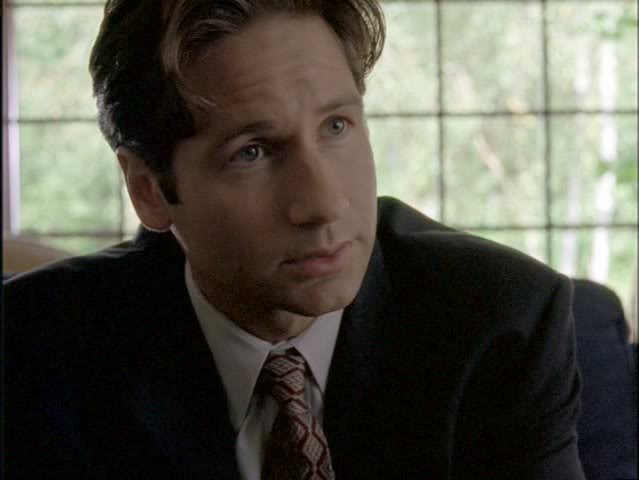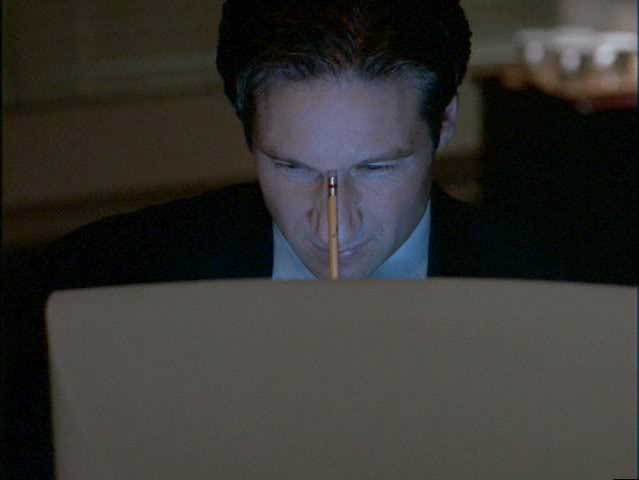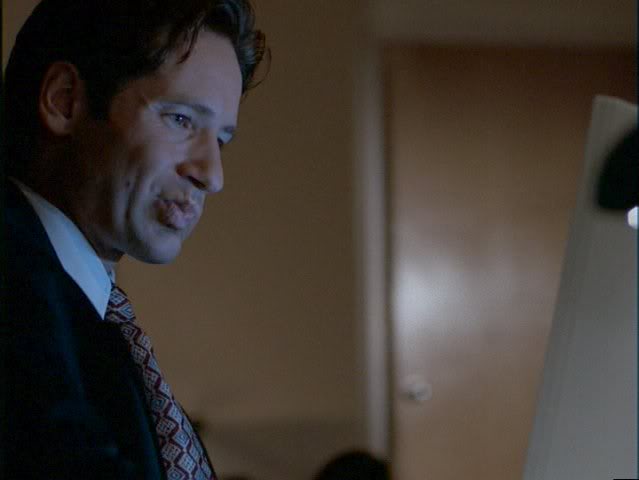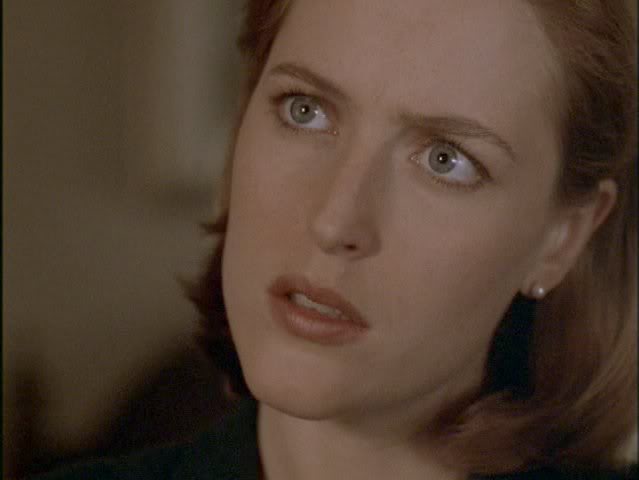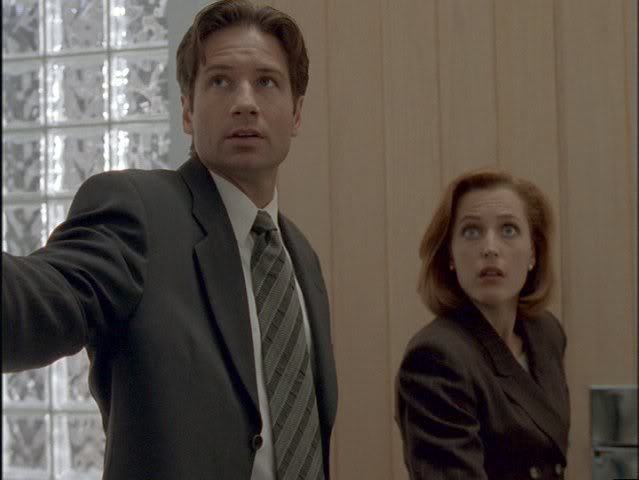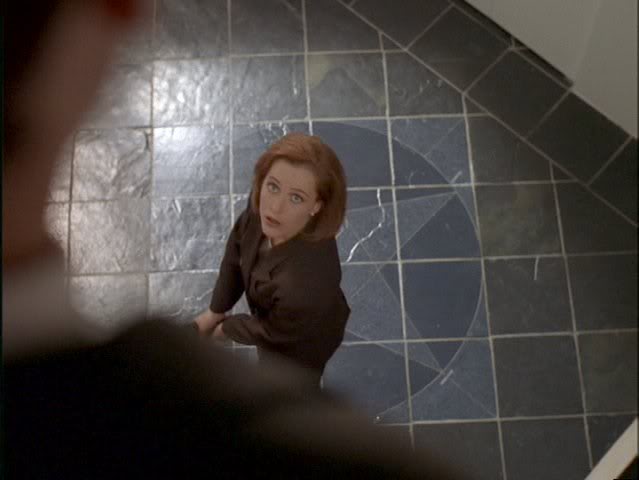CTP Episode of the Day - 08.17.06
Today's Cherished Episode: Sanguinarium (4x06)
Original Air Date: November 10, 1996
Written By: Valerie Mayhew and Vivian Mayhew
Directed By: Kim MannersAt a busy -- and lucrative -- cosmetic surgery clinic, doctors are murdering patients with the tools of their trade. Several clues point toward demonic possession.
"Everybody wants to be beautiful, Scully."
Some "Sanguinarium" Tidbits & Musings:
-- "Sanguinarium" is Latin for "Place of Blood." "Sanguinary" means carnage, bloodthirsty or consisting of blood. Finally, "Sanguinaria" means "Bloodroot."
-- Written by sisters Valerie and Vivian Mayhew, the most junior writers on the XF staff at that time, turning out their very first hour of network television, "Sanguinarium" was a rather bumpy and drawn-out "learning experience."
-- "It took a while before we got the story right -- and 'Sanguinarium' evolved with input from the entire XF team," said Valerie Mayhew, the younger and more talkative of the pair. "We did have some of our own ideas, but one of the things we did was bounce some of them off of Glen Morgan and Jim Wong. And they kept saying to us, 'The scariest things are the most everyday things. So -- what's scary?' And during one of these conversations, Vivian was paged. She didn't recognize the phone number, but she called it anyway. And we said: 'Isn't that interesting? That could have been anybody on the other end of the line.' We're so accessible via modern technology. You're connected to a completely unknown person who can influence your behavior as soon as you pick up the phone."
-- She added, "So -- pagers are scary. That was the first idea for the episode. But who uses pagers? Doctors use pagers. We all go to the doctor. We all hate hospitals. And doctors are someone you don't want to be influenced; you don't want to have them lose control of their faculties. So what would happen if doctors lost control? And why would they lose control? Well, of course, if they were bewitched. But who would bewitch a doctor? And why?" By that time, said Valerie, the pagers were long gone.
-- The Mayhews took their idea to Morgan and Wong who told them to change the sex of their villain from female to male. "They told us: 'Turn it around again. Plastic surgery is about vanity -- and you expect vanity from a woman. But not from a man.'"
-- Shortly thereafter the Mayhews submitted a first draft of their script. It triggered a restrained response -- and several major rewrites by Carter and the other members of the writing staff, working individually and as a whole. Carter is credited with focusing the story more tightly on its twin themes of greed and vanity. Howard Gordon came up with some of the more graphic elements -- like the words "Vanitas Vanitatum" scrawled in blood on Dr. Franklyn's bathroom wall.
-- Vince Gilligan, who also worked on the script, named one of the surgeons (Dr. Theresa Shannon) after one of his favorite actresses, Shannon Tweed. Tweed was Playboy magazine's Playmate of the Year in 1982 and her experience as an actress has been mostly in B movies. She is the longtime companion of Gene Simmons of the rock group Kiss, and they have two children together. The family is currently featured on the A&E reality TV series Gene Simmons Family Jewels. Her autobiography Kiss and Tell was published this year.
-- A blepharoplasty is plastic surgery of the eyelids.
-- "Vainglorious" -- Characterized by or exhibiting excessive vanity; boastful.
-- Anyone who's seen the gag reel knows that Gillian Anderson had quite a bit of difficulty pronouncing the word "pharmaceuticals" during the filming of this episode.
-- The words written in blood on Dr. Franklyn's mirror are "vanitas vanitatum" or "vanity of the vanities".
-- Black-magician Jack Franklyn lived at 1953 Gardner Street. Englishman Gerald Gardner founded his own form of witchcraft, Gardnerian, as well as revived the most-practiced form of modern witchcraft, or wicca. Gardner also published his first book on witchcraft in 1953 -- when laws against the practice were revoked.
-- Allotriophagy -- A depraved appetite; an unusual desire to eat unnatural or improper items for food.
-- Oopsie! Why don't they ever investigate *this* type of X-File: Mulder and Scully enter Dr. Franklyn's house and outside it's pouring rain -- but they're not wet. Spooky.
-- Mulder and Scully use a lot of big words in this one, but to me, it's two seemingly ordinary words that are the most interesting. Mulder says that Nurse Waite "yacked" up the stuff she ate. Is that a word? And Scully tells Mulder that Dr. Shannon swallowed a whole "whack" of surgical instruments. Is that what a group of surgical instruments is called? Like a herd of cows or a pride of lions? Since "Sanguinarium" is very hard to spell, I think this episode should have been called "Yack & Whack."
-- Chris Carter came up with the idea of decorating the plastic surgeons' wooden conference table with a subtly inlaid pentagram -- and production designer Graeme Murray took his idea to undreamed of lengths. In a tour de force of suggestive design that registered with most viewers only subliminally, he made the ASU surgical unit a suite of five operating rooms, each one positioned at the point of an imaginary pentagram. The scrub room the doctors use is also five-sided, as are the five stainless steel scrub sinks themselves.
-- The dates on which Dr. Franklyn's victims are born are significant because they fall on the traditional holidays of the ancient pagan world: Beltane - May 1; Lammas - August 1; Lughnasadh - June 21; Samhain or Halloween- October 31; Yule - December 21; Imboic - February 1.
-- Richard Beymer (Dr. Jack Franklyn) was best known for his role as Tony, one of the star-crossed lovers in the Oscar-winning screen version of the Broadway musical West Side Story (1961). He won a Golden Globe award in 1962 for Most Promising Male Newcomer -- tying with Bobby Darin and Warren Beatty. He also had a well-remembered role in the 1962 World War II epic The Longest Day. A stint at the Actors Studio in New York was interrupted by his decision to travel to the South as part of the civil-rights movement's struggle to register black voters in that region, and he wound up making an award-winning documentary about it. Beymer's film roles have been somewhat sporadic since the 1960s, but he kept busy with a spate of guest-starring roles on TV series, and in 1990 landed the part of Benjamin Horne in the cult TV series Twin Peaks. He did not work directly with David Duchovny during his time on that show, but he did work with one of his West Side Story co-stars -- Russ Tamblyn (who played Riff in the musical). Beymer was a one-time roommate of comic Andy Kaufman and originated on-stage at the Improv at 2:30 a.m. the "has-been corner" bit that Kaufman used in his TV specials.
-- Just a bit of West Side Story trivia. Richard Beymer may never have been cast in his breakthrough role if the person originally approached for the role of Tony had accepted the part -- Elvis Presley. Elvis' manager, Col. Tom Parker, believed that the role was wrong for Elvis and made him decline in favor of other movie musical roles. When the movie became a hit and won 10 Oscars, Elvis regretted turning down the part. After Elvis declined, several other young popular actors of the day auditioned for the part -- including Warren Beatty, Tab Hunter, Troy Donahue, Anthony Perkins, Richard Chamberlain, and Burt Reynolds. The producers had not considered Natalie Wood for the role of Maria. She was filming Splendor in the Grass with Warren Beatty and was linked with him romantically. When Beatty filmed his screen test for the role of Tony, Wood read opposite him as Maria, as she had been running lines with him to prepare him for the screen test. Ironically, the producers fell in love with the idea of Natalie as Maria and passed on Beatty as Tony. Richard Beymer and Natalie Wood both tried to do their own singing for the movie, but their voices were ultimately determined to be too unrefined and were overdubbed by Jimmy Bryant and Marni Nixon, respectively.
-- Retread Andrew Airlie played Dr. Lloyd's attorney in "Sanguinarium," but his previous XF appearance was a memorable one for fans; he played Rob, Scully's one and only date thus far in "Jersey Devil." He is currently appearing as Dr. Daniel Lanier on the TNT summer series "Saved."
-- In the opinion of the regular cast and crew, the one guest performance that stood out was that of O-Lan Jones, the veteran character actress (Edward Scissorhands, Natural Born Killers, Mars Attacks!) who played Nurse Rebecca Waite. "I loved her. She was really good," recalled David Duchovny.
-- Other Once & Future Retreads: Norman Armour (ER Doctor) played the Coroner in "Synchrony." Martin Evans (Dr. Hartman) appeared as the Major Domo in "Apocrypha" and in an uncredited role in "Paper Clip." Paul Raskin (Dr. Eric Ilaqua) was Ulrich in "The List." Greg Thirloway (Dr. Mitchell Kaplan) was Agent Nemhauser in "Grotesque." Constance Barnes played a nurse in this episode as well as in "Small Potatoes."
-- The Official Guide to Season 4 lists the "first aired" date for this episode incorrectly. The air date is listed as November 11, but the episode actually aired on November 10. Within the episode description, the Guide also lists Dr. Franklyn's name spelled two different ways -- Franklyn and Franklin.
-- "This was one of the most repulsive scripts that I've done," said Gillian Anderson. "During a couple of scenes -- like when the doctor is stabbing his patient -- I just had to shut my eyes."
-- David Duchovny, however, looked back on the bloodbath fondly. "This was a script I didn't get at all, but the show I really liked. This was another case where the script was kind of weak and when it came in it didn't make any sense. But Chris did a quick rewrite and everybody worked really hard and Kim Manners did a great job. It was really fun."
-- Less of a funfest was working with Fox's Standards and Practices department -- which had been lying in wait since the battles over "Home." They were particularly upset with the fat sucking and the face peel, and there were literally frame-by-frame discussions of how much could be left in. Unfortunately for editor Michael Stern, this was the next episode he did after "Home." In the end, Chris Carter stepped in to get many of the cuts reversed.
-- Of her long meetings with the censors, Valerie Mayhew recalled, "They were not happy. When (Director of Standards and Practices) Linda Shima-Tsumo came down to talk to us, her first words were: 'And you look like such normal girls.'"
-- No spell or incantation was powerful enough to stop the flood of angry letters and e-mail from supporters of Wicca and ritual magic in the XF audience. One of the witches prosecuted at Salem was named "Rebecca Nurse," and the most popular Tarot deck is the Rider-Waite deck; Arthur Edward Waite was a famous writer on medieval witchcraft and the co-creator of the modern tarot deck. Waite belonged to the same secret occult order as Alistair Crowley, a man whose theories were instrumental in laying the groundwork for modern Wicca. Angry practitioners and sympathizers accused the Mayhews of insensitivity, defamation, blasphemy, and worse. This backlash was surprising to the Mayhews, who had tried hard to avoid offending anyone -- taking care not to mention that either Nurse Waite or Franklyn were members of any particular sect or belief system.
-- Ironically, Rebecca Waite's name was originally Rebecca White -- she was named after a friend of the Mayhew sisters. "But the name didn't clear," said Valerie. "There was a nurse in Chicago [where the episode took place] by that name. So we plucked another name out of the air at the last minute."
-- Mulder picking his nose. Not as disgusting as it sounds.
I just love this shot
(Thanks to chrisnu for today's episode pics.)
Please share your first impressions, favorite (or cringe-worthy) moments, classic lines, favorite fanfic, nagging questions, repeated viewing observations, etc., as today we celebrate "Sanguinarium"!
Polly
